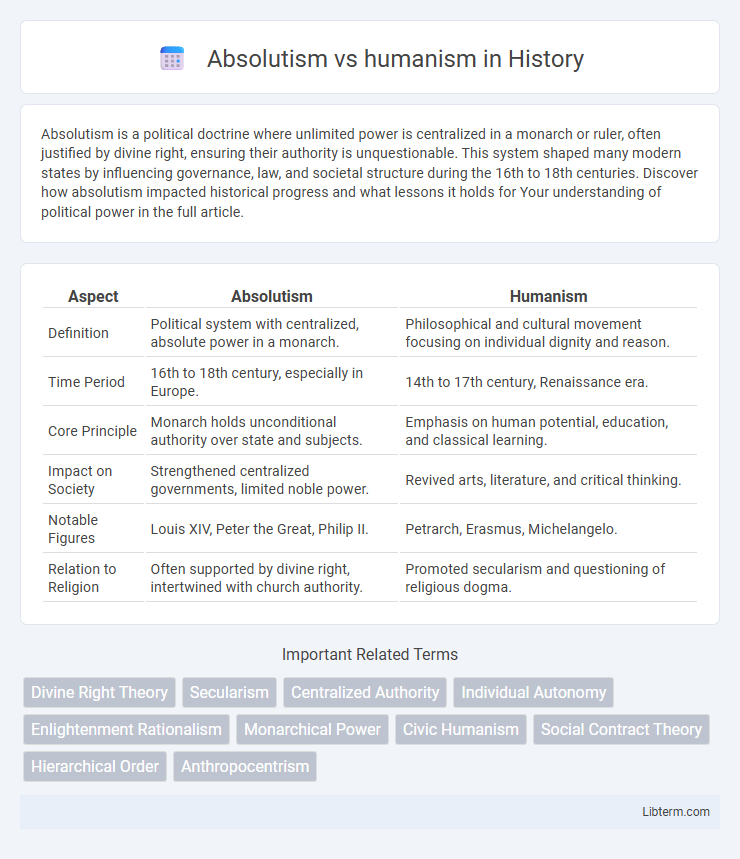Absolutism is a political doctrine where unlimited power is centralized in a monarch or ruler, often justified by divine right, ensuring their authority is unquestionable. This system shaped many modern states by influencing governance, law, and societal structure during the 16th to 18th centuries. Discover how absolutism impacted historical progress and what lessons it holds for Your understanding of political power in the full article.
Table of Comparison
| Aspect | Absolutism | Humanism |
|---|---|---|
| Definition | Political system with centralized, absolute power in a monarch. | Philosophical and cultural movement focusing on individual dignity and reason. |
| Time Period | 16th to 18th century, especially in Europe. | 14th to 17th century, Renaissance era. |
| Core Principle | Monarch holds unconditional authority over state and subjects. | Emphasis on human potential, education, and classical learning. |
| Impact on Society | Strengthened centralized governments, limited noble power. | Revived arts, literature, and critical thinking. |
| Notable Figures | Louis XIV, Peter the Great, Philip II. | Petrarch, Erasmus, Michelangelo. |
| Relation to Religion | Often supported by divine right, intertwined with church authority. | Promoted secularism and questioning of religious dogma. |
Defining Absolutism and Humanism
Absolutism is a political doctrine where a single ruler holds supreme authority, unchallenged by laws or legislature, often justified by divine right or centralized power. Humanism emphasizes the value and agency of human beings, advocating for reason, individual dignity, and critical thinking rooted in classical learning and Renaissance ideals. The contrast lies in Absolutism's focus on centralized power and control versus Humanism's emphasis on human potential and intellectual freedom.
Historical Origins of Absolutism
The historical origins of absolutism trace back to the 16th and 17th centuries during the rise of centralized monarchies in Europe, particularly in France under Louis XIV. Absolutism emerged as monarchs sought to consolidate power, diminish the influence of nobles, and control the state apparatus without parliamentary constraints. This political doctrine contrasted sharply with humanism, which emphasized individual potential, critical thinking, and the cultural revival of classical knowledge during the Renaissance.
The Emergence of Humanism in Renaissance Thought
The emergence of humanism during the Renaissance marked a shift from the rigid, centralized authority of absolutism to the celebration of individual potential and classical learning. Humanism emphasized the study of humanities--literature, philosophy, and arts--encouraging critical thinking and a secular worldview that challenged the divine right of kings. This intellectual movement laid the groundwork for modern democratic ideals by promoting reason, education, and a more personal connection to knowledge and governance.
Core Philosophical Differences
Absolutism centers on the concentration of power in a sovereign authority, emphasizing order, hierarchy, and unchallengeable rule based on divine right or legal supremacy. Humanism prioritizes individual dignity, reason, and the potential for self-improvement, advocating for critical thinking and ethical autonomy rooted in Renaissance human values. Core philosophical differences lie in absolutism's reliance on centralized power versus humanism's emphasis on human agency and moral responsibility.
Political Implications of Absolutism
Absolutism centralized political power in the hands of monarchs, eliminating checks from nobility and representative bodies, which led to the establishment of highly controlled states. This concentration of authority often resulted in limited political freedoms and diminished opportunities for public participation in governance. In contrast to humanism's emphasis on individual rights and civic responsibility, absolutism prioritized state sovereignty and monarchical dominance over political structures.
Social Impact of Humanism
Humanism fostered individual dignity and intellectual freedom, challenging the rigid hierarchy imposed by Absolutism and promoting social reforms. It inspired educational advancements and cultural flourishing by emphasizing human potential and critical thinking over authoritarian rule. This shift empowered a growing middle class, encouraging civic participation and weakening the centralized control of monarchs.
Key Figures in Absolutism and Humanism
Key figures in Absolutism include Louis XIV of France, who centralized power and embodied the divine right of kings, and Peter the Great of Russia, who modernized the state through autocratic rule. In Humanism, prominent figures like Erasmus promoted Renaissance ideals of education and individual potential, while Giovanni Pico della Mirandola emphasized human dignity and intellectual freedom. These leaders shaped political authority and cultural rebirth, reflecting contrasting approaches to governance and human value during the Renaissance and early modern periods.
Absolutism vs Humanism in Art and Literature
Absolutism in art and literature emphasized grandiose, authoritative themes that glorified monarchy, with artists producing works portraying rulers as divine or infallible figures, reinforcing political power. Humanism shifted focus to individual experience, classical antiquity, and secular subjects, promoting realistic representation, human emotion, and critical inquiry in Renaissance art and literature. The tension between these movements shaped cultural production by contrasting hierarchical control with human-centered exploration and expression.
Lasting Influence on Modern Societies
Absolutism shaped the framework of modern governance by centralizing power and reinforcing the authority of the state, influencing contemporary political systems and legal structures worldwide. Humanism, emphasizing individual dignity and secular knowledge, laid the intellectual groundwork for modern democratic ideals, human rights, and scientific inquiry. Together, these philosophies forged enduring legacies that continue to impact modern societal values, governance, and cultural development.
Contemporary Perspectives and Debates
Contemporary perspectives on absolutism versus humanism highlight ongoing debates about governance and individual rights, with absolutism emphasizing centralized authority and humanism advocating for personal freedom and moral agency. Scholars analyze the relevance of absolutist principles in modern political systems, contrasting them with humanist ideals that stress human dignity and rationality in policy-making. Current discourse often centers on balancing state power and individual autonomy in democracies, reflecting the enduring tension between these philosophical frameworks.
Absolutism Infographic

 libterm.com
libterm.com